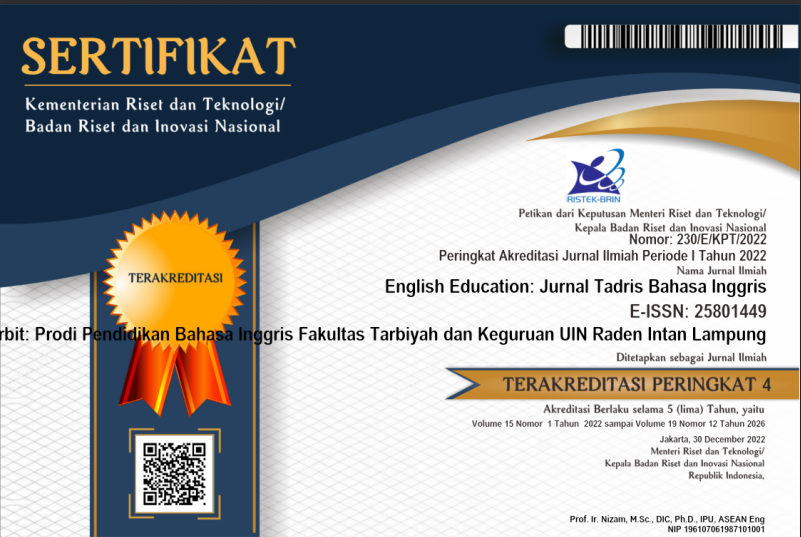Cross Cultural Perspective towards the Realization of EFL Learners’ Request Appropriateness and Politeness
Abstract
Full Text:
PDFReferences
Al-Marrani, YMA, and Azimah. (2010). Polite Request Strategies by Male Speakers of Yemeni Arabic in Male-Male Interaction and Male-Female Interaction. The International Journal of Language Society and Culture.
Amaya, Lucía Fernández. (2008). Teaching Culture: Is It Possible to Avoid Pragmatic Failure? Revista Alicantina de Estudios Ingleses, 21, 11-24.
Ashoorpour, B, and Azari, Househang (2014). The Relationship Between Grammatical Knowledge and Pragmatic Knowledge of Speech Act of Request in Iranian EFL Learners. Asian Journal of Sciences and Humanities. Vol. 3(1).
Bachman, L. (1990). Fundamental considerations in language testing. Oxford: Oxford University Press.
Bardovi-Harlig, K., Hartford, B. A. S., Mahan Taylor, R., Morgan, M. J., & Reynolds, D. W. (1991). Developing pragmatic awareness: Closing the conversation. ELT Journal, 45(1), 4-15.
Blum-Kulka, S., House, J., & Kasper, G. (1989). Cross-cultural pragmatics: Requests and apologies. Norwood, NJ: Ablex.
Blum-Kulka, S., & Olshtain, E. (1984). Requests and apologies: A cross-cultural study of speech act realization patterns. Applied Linguistics, 5, 196- 213.
Cohen, A. D. (2008). Teaching and assessing L2 pragmatics: What can we expect from learners? Language Teaching, 41 (2), 213-235.
Crystal, D.(1997). A dictionary of linguistics and phonetics. 4th edition. Cambridge, MA: Blackwell.
Eslami-Rasekh, Z. (2005). Raising the pragmatic awareness of language learners. ELT Journal, 59 (3), 199-208.
Fraser, Bruce. (2010). Pragmatic Competence: the Case of Hedging. In Kaltenbock, G., Mihatsch, W., & Schneider, S. (Eds.), Studies in Pragmatics 9: New Approaches to Hedging (pp. 15-34). Bingley: Emerald Group Publishing Ltd.
Gass, S. M., & Selinker, L. (2001). Second language acquisition: An introductory course. Mahwah, NJ: Lawrence Erlbaum Associates, Inc.
Han, Xiuping. (2013). A contrastive Study of Chinese and British English Request Strategies Based on Open Role Play. Journal of Language Teaching and Research. Vol. 4, No. 5.
House, J. (1989). Politeness in English and German: The function of please and bitte. In S. Blum-Kulka, J. House, and G. Kasper (eds.).
Jae-Suk, S. (1999). Pragmatic perception of politeness in requests by Korean learners of English as a second language. International review of applied linguistics in language teaching, IRAL, 37 (3), 195-214.
Kitao, K. (1988). Differences between politeness strategies used in requests by Americans and Japanese. Doshisha Studies in English, (44-45), 326-343.
Lee, Yu-Cheng. (2011). Comparison of Politeness and Acceptability Perceptions of Reuest Strategies Between Chinese Learners of English and Native English Speakers. Asian Social Science. Vol. 7 No. 8.
Leech, G. (1983). The principle of pragmatics. New York: Longman.
Lihui, Zheng, & Jianbin, Huang. (2010). A study of Chinese EFL learners’ pragmatic failure and the implications for college English teaching. Polyglossia, 18, 41-54.
Lorenzo-Dus, Nuria. and Bou-Franch, Patricia. (2003). Gender and Politeness: Spanish and British undergraduates’ Perceptions of Appropriate Requests. Genero, Lenguaje y traduccion, Jose Santaemilia (ed) Valencia.
McKay, S. L. (2002) Teaching English as an international language. Oxford: Oxford University Press.
Meier, A. J (1997). Teaching the universals of politeness. ELT Journal. Vol 51/1. Oxford University Press.
Riggenbach, H., & Lazaraton, A. (1991). Promoting oral communication skills. In M. Celce-Murcia (Ed.), Teaching English as a second or foreign language (2nd ed.) (pp. 125-136). Boston: Heinle & Heinle.
Searle, J. R. (1976). The classification of illocutionary acts. Language in Society, 5, 1–14.
Taguchi, N. (2006). Analysis of appropriateness in a speech act of request in L2 English. Pragmatics, 16 (4), 513-533.
Thomas, Jenny. (1983). Cross cultural pragmatic failure. Applied Linguistics, 4, 91-112.
Trosborg, A. (1995). Interlanguage pragmatics: Requests, complaints, and apologies.Berlin, Germany: Mouton de Gruyter.
Zhu, Jiang, and Bao, Yuxiao. (2010). The Pragmatic Comparison of Chinese and Western “Politeness” in Cross-cultural communication. Journal of Language Teaching and Research. Vol. 1, No. 6.
Lorenzo-Dus, Nuria. and Bou-Franch, Patricia. (2003). Gender and Politeness: Spanish and British undergraduates’ Perceptions of Appropriate Requests. Genero, Lenguaje y traduccion, Jose Santaemilia (ed) Valencia.
DOI: http://dx.doi.org/10.24042/ee-jtbi.v10i1.882
English Education: Jurnal Tadris Bahasa Inggris, UIN Raden Intan Lampung is licensed under a Creative Commons Attribution-ShareAlike 4.0 International License. pISSN: 2083-6003, eISSN: 2580-1449.









